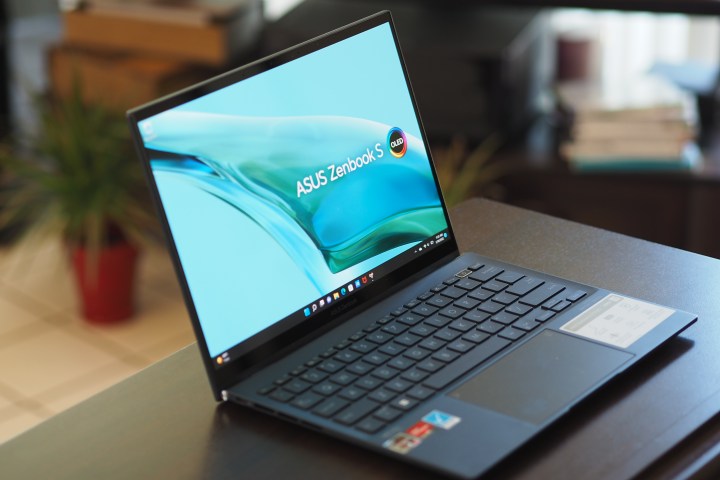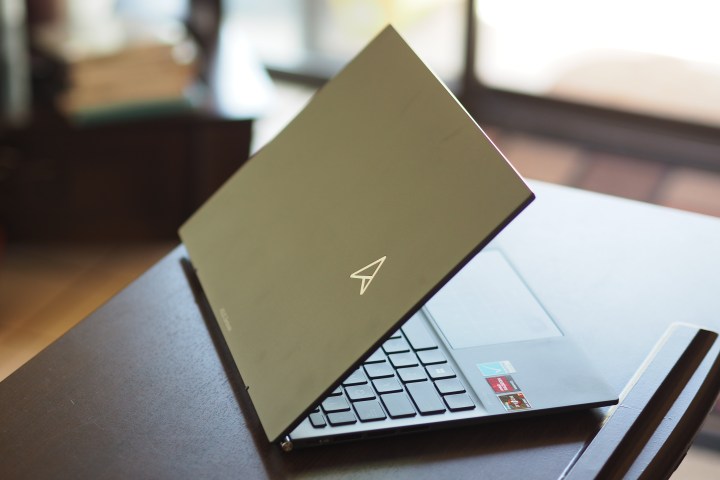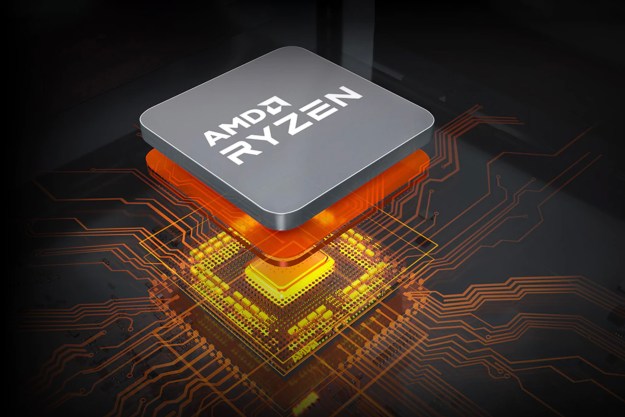Intel’s 12th-gen laptops chips have made quite a leap forward, and we’ve been waiting for AMD’s response. And now, as tested in the new Zenbook S 13 OLED (UM5302), we’ve seen that response — at least partially.
This new Zenbook S 13 features the Ryzen 7 6800U, part of AMD’s new Ryzen 6000 series of chips, packed away inside. These are a low-power variant intended for thin and light laptops and are based on the company’s Zen 3+ architecture.
This won’t be a full review of the Zenbook S 13 OLED (that’s coming later), but it’ll be a solid introduction to these chips. The stakes are high against Intel’s 12th-gen chips, and though we’ll need more data to flesh out the comparison, AMD’s new chips are certainly still in the running.
Understanding the lineup

The Ryzen 7 6800U is an 8-core/16-thread chip that runs at a base of 15 watts and is configurable up to to 28 watts. That compares to the 8-core/16-thread Ryzen 7 6800H, which we haven’t tested yet and is a 45-watt part. The Zenbook S 13 OLED presents a challenge for any chip given its thin 0.59-inch chassis — there’s not a lot of room inside for a complex thermal design or large fans. So, I was looking forward to seeing the Ryzen 7 6800U’s performance even when compared with the CPUs in some other, larger laptops.
Other than the Dell XPS 13, the laptops in our comparison group are 14-inch machines or larger. That means they likely offer more space for better thermals, and we should keep that in mind as we consider the Ryzen 7 6800U’s performance in the Zenbook S 13 OLED. I selected these
And just what is the Ryzen 7 6800U’s main competition? Well, it’s a little confusing. In the past, Intel had a direct comparison in its U-series chips, which also ran at 15 watts. But now, the lineup is split in three ways: 28-watt P-series chips, 15-watt U-series chips, and 9-watt U-series chips.
Without getting into all the details, it’s fair to compare the Ryzen 7 6800H against the Core i7-1260P. It’s a 12-core (four Performance and eight Efficient), 16-thread CPU running at a base TDP of 28 watts. Intel also has a lower-powered configuration, such as the Core i7-1260U, which is a 10-core (two Performance, eight Efficient), 12-thread version with a base TDP of 9 watts. That’s not a fair comparison, of course, and we haven’t tested it yet.
Testing performance against Intel
Comparing the Ryzen 7 6800U with the Core i7-1260P, we see it falling significantly behind in Geekbench 5 in both single-core and multi-core scores. In fact, it’s not much faster than some last-generation chips, including the Ryzen 7 5800U, the Core i7-11370H, and the Core i7-1185G7.
| Geekbench (single/multi) |
Handbrake (seconds) |
Cinebench R23 (single/multi) |
PCMark 10 Complete |
3DMark Time Spy |
|
| Asus Zenbook S 13 OLED (Ryzen 7 6800U) |
1,417 / 6,854 | 112 | 1,402 / 8,682 | 5,647 | 2,110 |
| Lenovo Yoga 9i 14 Gen 7 (Core i7-1260P) |
1,717 / 9,231 | 130 | 1,626 / 7,210 | 5,760 | 1,658 |
| Lenovo Yoga 9i 14 Gen 7 (Core i7-1260P) – Performance mode |
1,712 / 10,241 | 101 | 1,723 / 8,979 | 5,816 | 1,979 |
| Samsung Galaxy Book 2 Pro (Core i7-1260P) |
1,709 / 9,457 | 114 | 1,637 / 8,066 | 5,585 | N/A |
| Lenovo IdeaPad Slim 7 Carbon (Ryzen 7 5800U) |
1,373 / 6,080 | 125 | 1,409 / 8,086 | 5,682 | 1,308 |
| Lenovo IdeaPad Slim 7i Pro (Core i7-11370H) |
1,578 / 5,957 | 202 | 1,514 / 5,544 | 5,149 | 1,888 |
| Dell XPS 13 (Core i7-1185G7) |
1,549 / 5,431 | 204 | 1,399 / 4,585 | n/a | 1,380 |
But switching to our Handbrake test that encodes a 420MB video as H.265, it competes far better against the Core i7-1260P chips as tested in the Samsung Galaxy Book 2 Pro and the Lenovo Yoga 9i 14 Gen 7. The Lenovo is faster in its performance mode, though that likely has more to do with the laptop itself.
Interestingly, I used the Asus performance tuning utility on the Zenbook S 13 to benchmark in both balanced and performance modes, and there was little difference between them. In the Zenbook, the Ryzen 7 6800U throttles in performance mode in Cinebench R23, quickly hitting the CPU’s maximum temperature of 95 degrees C and dropping down in performance.
Speaking of Cinebench, the Ryzen 7 6800U was again in line with the Core i7-1260P laptops and 13% faster than the Ryzen 7 5800U in the Lenovo IdeaPad Slim 7 Carbon. It was significantly faster than the previous-gen Core i7s, of course, which lacked the high core count.

In PCMark 10, all the laptops in the comparison group provided similar performance. This benchmark doesn’t put too much pressure on the CPU and represents typical productivity work, meaning the last couple of generations of CPUs have been plenty fast.
Finally, the Ryzen 7 6800U’s integrated Radeon Graphics make a significant jump from last year’s AMD chips, catching up to Intel’s Iris Xe graphics, featured in those Core i7-1260P machines. In fact, it scored slightly higher in 3DMark. Of course, this is still a chip that will power entry-level gaming at low settings best.
Battery life
The Zenbook S 13 OLED packs in a 67 watt-hour battery, which is large for a 13-inch laptop. At the same time, it was built around a 16:10, 2,880 x 1,800 OLED touch display that’s power-hungry. So, it’s always challenging to compare the specific impact of a CPU on battery life with so many other factors involved.
In our web-browsing test that cycles through a series of popular and complex websites, the Zenbook S 13 OLED lasted for just over eight hours. That’s behind the Lenovo Yoga 9i 14 Gen Gen 7 and Lenovo IdeaPad Slim 7 Carbon, both with high-res 14-inch IPS displays. Frankly, I expected the Zenbook to last longer in this test. Then, in our video test that loops a local 1080p movie trailer, the Zenbook made it to around 13.5 hours. Both are decent scores, but nothing to write home about.
While we can’t really compare CPU efficiencies with these benchmarks, we can at least conclude that the Ryzen 7 6800U doesn’t stand out in its efficiency. And that’s no surprise, given that it can pull as much power as the Core i7-1260P at its top end.
| Web browsing test | Video test | |
| Asus Zenbook S 13 OLED (Ryzen 7 6800U) |
8 hours, 4 minutes | 13 hours, 13 minutes |
| Lenovo Yoga 9i 14 Gen 7 (Core i7-1260P) |
9 hours, 10 minutes | 12 hours, 45 minutes |
| Lenovo IdeaPad Slim 7 Carbon (Ryzen 7 5800U) |
10 hours, 6 minutes | 11 hours, 12 minutes |
| Lenovo IdeaPad Slim 7i Pro (Core i7-11370H) |
7 hours, 43 minutes | 12 hours, 46 minutes |
| Dell XPS 13 (Core i7-1185G7) |
6 hours 20 minutes | 10 hours, 32 minutes |
A lot more to discover
Ultimately, we can’t say anything overly definitive about the Ryzen 7 6800U from these brief tests in the Zenbook S 13 OLED just yet. It’s clearly a powerful chip for compact laptops, though, and it certainly feels competitive with Intel’s latest offerings.
We’ll need to see it perform in larger laptops with more thermal headroom to draw accurate conclusions. But the initial impression is that the Ryzen 7 6800U competes well against Intel’s Core i7-1260P, maintaining AMD’s spot as a viable performance alternative against Intel’s latest.
Editors' Recommendations
- AMD’s new CPU slammed as ‘anti-consumer at best’
- AMD’s new 65W processors fix Ryzen 7000’s biggest problems
- AMD’s new Ryzen 7000 CPUs just got a huge discount
- AMD says the $300 Ryzen 5 7600X beats Intel’s best by up to 17%
- AMD steals Intel’s spotlight with new Ryzen 7000 release date



